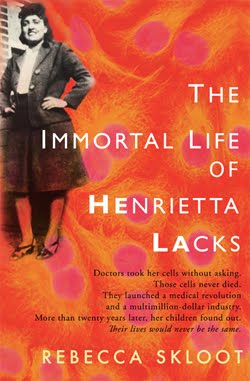This review contains affiliate links, which earn me a small commission when you click and purchase, at no extra cost to you. Thank you for supporting my small business and allowing me to continue providing you a reliable resource for clean book ratings.
Before Henrietta Lacks died in 1951 of an aggressive case of cervical cancer, a surgeon took a small sample of her cancer and gave it to Dr. George Gey, who had been trying — and failing — for years to grow human cells in culture in the lab. No one would have guessed that not only did Henrietta’s cells survive outside her body, “they were growing with mythological intensity. As long as they had food and warmth, Henrietta’s cancer cells seemed unstoppable.” It was then that Gey could allow himself to believe he had succeeded at last in growing the first immortal human cells.
The HeLa line of cells has been growing for almost 60 years now, and the cells have been given away and sold commercially to labs around the world, used in all kinds of research: Scientists have “used HeLa to test the effects of steroids, chemotherapy drugs, hormones, vitamins, and environmental stress; they infected them with tuberculosis, salmonella, and the bacterium that causes vaginitis;” they have been exposed to huge amounts of radiation and sent into space. They helped scientists stop polio. In short, the cells have been critical to scientific research and advances in medicine for years.
The main problem in all of this good news is that Henrietta’s family didn’t know of any of this for 20 years. Henrietta never gave any kind of consent that her tissues be used for research, and her family never knew either. They weren’t informed by the scientists or doctors that part of their mother was still alive and being put through a barrage of tests; they never received any recognition or remuneration for their mother’s giant contribution to the field of science. When they did find out through a series of events, they were shocked, shaken and confused.
In The Immortal Life of Henrietta Lacks, Rebecca Skloot traces the story of both Henrietta’s cells and her family over the course of 50 years or so. She juxtaposes the story of a generally poor, uneducated black family in Virginia and Baltimore who couldn’t understand what had happened to their mother or her still-living cells with the science that made the HeLa cells famous. Through it all, Skloot brings up the issues of bioethics, privacy, informed consent and the “greater good” of scientific progress, all in a way that brings home the individual, personal impact of decisions made by doctors and scientists while stressing just how much good has come from the unwitting “donation” made by Henrietta Lacks. It’s a fascinating book thanks to the skillful handling of all of those elements.
Rated: Moderate, for three uses of strong language, some other uses of mild and moderate language and some brief references to abuse.
Click here to purchase your copy of The Immortal Life of Henrietta Lacks on Amazon.




